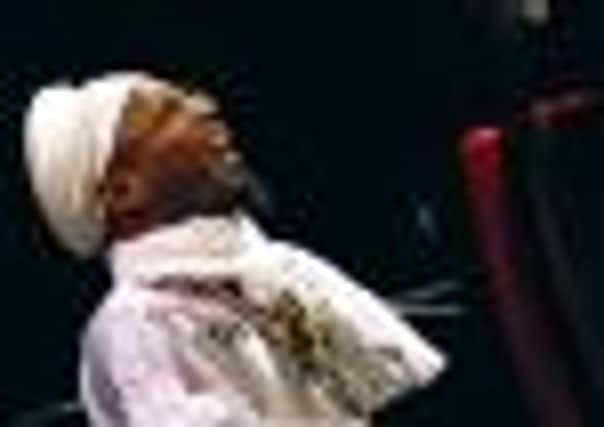Interview: Omar Sosa, Cuban pianist appearing at Celtic Connections


SCATTERING exuberant double-handfuls of steamy Latin jazz or making the keyboard chime with Satie-like stillness, mixing traditional African sounds with electronic grooves or partnering North African oud players and Italian trumpeters… Omar Sosa’s musical creativity, it seems, knows no bounds, cultural or geographical.
The 46-year-old Barcelona-based Cuban pianist, who commands the stage in flowing white robes, has been no stranger to Scotland over the past decade, but his Celtic Connections appearance in Glasgow’s Old Fruitmarket on 3 February will have a special resonance. He’s dedicating it to the memory of Billy Kelly, the music promoter who died in 2007, and whom Sosa regarded as his mentor in Scotland. “It’s my way of saying ‘Thank you Billy’ for all the opportunities he gave me to play music in Glasgow,” says Sosa.
Advertisement
Hide AdAdvertisement
Hide AdThe Old Fruitmarket gig promises to be a far from melancholy affair, however. Sosa is capable of generating electrifying acoustic music, but on this occasion he’s bringing a high-powered quintet version of his Afreecanos ensemble, which blends traditional African sounds with electronica. Featuring his regular collaborator Marque Gilmore from New York on drums and electronics, German trumpeter Joo Kraus, Mozambiquan bassist Childo Tomas and fellow-Cuban Leandro Saint-Hill on saxophone, the band provides a more contemporary take on the kind of pan-African explorations Sosa made on his Afreecanos album of 2008. Srum’n’bass wizard Gilmore, along with Tunisian oud player Dhafer Youssef, accompanied Sosa in a memorable set at Edinburgh’s Queen’s Hall some years ago.
Sosa’s band will be supported by another wide-ranging talent, the Paris-based Lebanese trumpeter Ibrahim Maalouf, who blends Arabic music with jazz, Latin-American, rock and other contemporary influences, and who was worked with the likes of Amadou & Mariam, Salif Keita and Sting.
So far as Sosa’s own group is concerned, “it uses electronic elements,” he says, “but always keeping the African groove, the African tradition, with contemporary harmonies. We use electronics with authority, with beauty and with a refined touch.
“Everybody has computers today, and electronics is a big part of music in the world,” says Sosa, who regards Africa very much as the mother lode from which Latin American music and much else has been drawn. In fact his first composition for large orchestra was an “Afro-symphonic” work titled From Our Mother, incorporating Cuban, Venezuelan and Ecuadorian influences with modern jazz harmonies, premiered in Oakland, California, in 2003 – the same year that his contribution to the development of Latin Jazz in the United States was recognised with a Lifetime Achievement Award from the Smithsonian Institution.
One of the leading voices in American contemporary music, composer John Adams, who included Sosa’s quartet in the programme he curated to inaugurate the new Zankel Hall venue at Carnegie Hall in 2003, has described Sosa as “a deeply creative musician with an extraordinary harmonic sense. His piano playing is sui generis: it has obvious roots in Cuban music, but he’s taken his approach to the keyboard into completely new regions”.
But while happy working with large-scale and eclectic resources, as exemplified by the vivid instrumental palette of albums such as Afreecanos and Mulatos, Sosa, who was a child prodigy on the marimba before studying classical piano in Havana, can also pare things down to a telling minimum, as in solo piano recordings such as the lyrical deliberations of 2009’s Calma, in which he used acoustic and electric pianos as well as judicious deployment of electronic effects and samples. If Afreecanos was a pan-African homage to the motherland, exploring the cultural and religious heritage of Senegal, Guinea, Mozambique and elsewhere, his earlier, award-winning Mulatos album married Afro-Cuban jazz with such disparate ingredients as Arab oud, Indian tabla and European clarinet, and also featured the great Cuban reedsman Paquito D’Rivera.
Over the past two decades, the energetic Sosa has recorded 22 albums as a band leader on his Otá label. The latest of them, Alma, was released just this month and looks to Europe, with the pianist duetting with the Italian trumpet and flugelhorn player Paolo Fresu, with contributions from the Brazilian conductor and cellist Jaques Morelenbaum. Alma is Spanish for “soul”, “and if you like Calma maybe you’re going to love Alma,” Sosa assures me with unabashed enthusiasm. “We have a really good feeling when I play with Paulo. He and I have different roots, but we play with the same soul.”
Advertisement
Hide AdAdvertisement
Hide AdSosa has also recently finished another group recording which he hopes will be released around the end of this year.
He’s calling it Eggun, a Yoruba term referring to the spirits of the dead, and it promises once again to combine his Afro-Cuban soul music with electronics and much more in evoking ancestral voices.
• Omar Sosa plays the Old Fruitmarket, Glasgow, on 3 February. See www.celticconnections.com and www.omarsosa.com